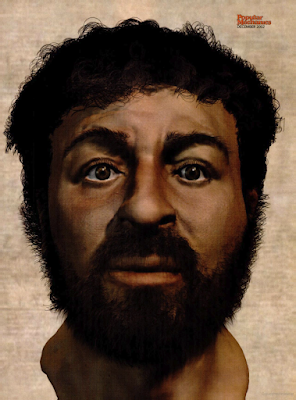If you identify as a Christian - and there is a wide spectrum of beliefs about what the term 'Christian' means - then it is a given that there was and still is something special about the charismatic carpenter-turned-preacher who lived around two thousand years ago in Palestine.
If you identify as a Humanist - and declare there is no God - then you still might have more than a passing interest in the person that 19th century theologians called the 'historical Jesus'. Intellectual curiosity might mean you want to find out more about the historical person called Jesus - what did he say? what did he do? why was he killed? why, after his death, did he become the focus for a religious cult who believed he had been restored to life and was actually the Son of God?
You might also be intrigued by the question: 'What did Jesus look like?, knowing that the historical reality was bound to be different from the Caucasian stereotype of western popular imagination. In fact, Israeli archaeologists and British forensic experts collaborated in 2015 to develop a computer model of the face of Jesus based on forensic archaeology. Led by the retired medical artist Dr. Richard Neave, formerly of the University of Manchester, the images constructed by the team of scientists suggest that Jesus of Nazareth might have had a wide face, with dark eyes, short dark hair, a bushy beard, and olive-coloured, tanned skin. Dr. Neave and his team based their reconstruction on the analysis of three Semite skulls which had been dated to around the same period when Jesus lived, combining the data with anthropological references.
 |
| A computer image of what Jesus of Nazareth may have looked like |
I am one of those modern, liberal Christians who do not take the bible as the literal word of God. That is our common ground with Humanists. Instead, we turn to what we see as a precious gift: the tool of de-mythologizing. We take the traditional, orthodox stories in the biblical text, root them in their historical context as any good historian would do - and then try to tease out what is timeless and of universal significance in these tales from the past. Our instincts tell us that there is much fruit within these stories. As Quakers would say, we are following the Light - the Spirit is leading us to truths that are timeless and
give meaning to our human existence.If you want an inkling of what I find timeless and of universal importance in the biblical stories about Jesus and his teachings, you might like to press this link here. This will give you access to six posts I wrote in the summer of this year. They highlight his importance as a prophet who was warning against the dangers inherent in wealth and power - as a man who was urging people to return to the old communitarian ways where hierarchies were shunned. I am at peace within the Quaker church. It has no hierarchy. It was born at a time of radical change in the 17th century when even the monarchy was replaced for a time. It shuns war. In the words of Advices and Queries No. 31:
'We are called to live 'in the virtue of that life and power that takes away the occasion of all wars'. Do you faithfully maintain our testimony that war and the preparation for war are inconsistent with the spirit of Christ? Search out whatever in your way of life may contain the seeds of war. Stand firm in our testimony, even when others commit or prepare to commit acts of violence, yet always remember they too are children of God.
 |
| H.G.Wells (1866-1946) - Wikipedia records that: 'The Outline of History, subtitled either "The Whole Story of Man" or "Being a Plain History of Life and Mankind", is a work by H. G. Wells chronicling the history of the world from the origin of the Earth to the First World War. It appeared in an illustrated version of 24 fortnightly installments beginning on 22 November 1919 and was published as a single volume in 1920. It sold more than two million copies, was translated into many languages, and had a considerable impact on the teaching of history in institutions of higher education'. Living through the Great War as a middle-aged non-combatant, Wells felt compelled to make sense of this tragedy by placing it in an historical context. |
There is a consensus amongst historians that the person we know as Jesus was a Palestinian Jew who lived a relatively short life of around thirty-three years before being executed as a threat to imperial security on the orders of Pontius Pilate, the Roman governor in charge of the occupation forces. Jesus had been, it seems, a carpenter like his father before taking to the road for the last three years of his life and becoming the itinerant preacher and faith-healer, a charismatic man of God with his own band of disciples. There had been others like him before and it seems improbable that there were not other holy men in his own lifetime trying to make sense of the tragedy that had befallen the Israelite nation. The Jewish people were facing the trauma of what amounted to a rejection by God Almighty. Their destiny was not to be conquered and ruled by another power. Little was making sense.
Many would have turned to the comfort of believing that these desperate years of national disgrace were in fact a precursor to the End Time for the world when the Israelite people would be restored to their former glory. There are eschatological beliefs within the messages conveyed by Jesus. After his death, nailed to a cross and crucified, his disciples became convinced that Jesus had risen from the dead - and would soon come again in glory and in judgement at the end of the world as they had known it. He had indeed been the Son of God even as he lived out his earthly life. The writings of the New Testament are saturated with this conviction that Jesus would return in triumph, in person - and the early Church followed these beliefs. Many in the Church today still do.
 |
| Albert Durer (1471-1528) - 'Four Riders of the Apocalypse' - inspired by the Book of Revelations |
That is not my way or the way of other liberal Christians. We may, of course, be mistaken. But as I see it, that wouldn't matter much. I am more interested in what the teachings of Jesus have to say to us about how we are meant to live out our lives as members of the human community. I think one reason why the memory of his lifetime has survived through time is the extraordinary nature of his wisdom. The message in his words, as recorded in the biblical text, still contains the freshness and originality that so excited his original audiences two millennia ago. I believe he was moved by what I and others term the Spirit, a universal force that is within all humanity, as much part of our being as language. We are all, as a species, programmed to communicate through a language of words and grammar in a way that distinguishes us from other creatures. My faith, shared by others, is that the Spirit is in all of us too.
I also believe that this Spirit leads us to whatever good we may do during our lifetime. Bad stuff happens when our own narcissism snuffs out the promptings of the Spirit. And since the Spirit is in all of us and underpins all that is good in our actions, it follows that we should be evaluated on the fruits of that Spirit. Judge a person by the goodness they do, not for the formulations of their faith. I don't believe in a literal heaven, but I am sure that if it did exist it would be filled with atheists as well as theists, by humanists as well as Christians of wide diversity.
 |
| My acknowledgements and thanks to http://www.psychalive.org |
No comments:
Post a Comment